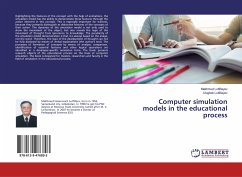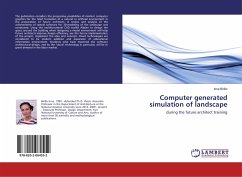
Computer simulation models in the educational process
Versandkostenfrei!
Versandfertig in 6-10 Tagen
27,99 €
inkl. MwSt.

PAYBACK Punkte
14 °P sammeln!
Highlighting the features of the concept with the help of animations, the simulation model has the ability to demonstrate these features through the action inherent in this concept. This is especially important for trainees, because they primarily distinguish as distinctive features of the concepts of their action. The dynamics of the simulation model is not only used to show the movement of the object, but also reveals the logic of the movement of thought from ignorance to knowledge. The peculiarity of the simulation model demonstration is that it is always based on the image, not the word. T...
Highlighting the features of the concept with the help of animations, the simulation model has the ability to demonstrate these features through the action inherent in this concept. This is especially important for trainees, because they primarily distinguish as distinctive features of the concepts of their action. The dynamics of the simulation model is not only used to show the movement of the object, but also reveals the logic of the movement of thought from ignorance to knowledge. The peculiarity of the simulation model demonstration is that it is always based on the image, not the word. Therefore, the logic of the development of thought can not be fully disclosed by means of verbal explanations (the author's text). The processes of formation of concepts by means of analysis, comparison, identification of essential features and other logical operations are identified in a developer-specific animation form. The book presents research objects of the educational process on the basis of computer simulation. The book is designed for masters, researchers and faculty in the field of simulation in the educational process.












